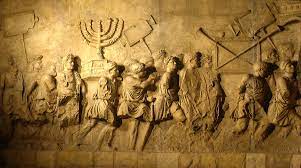
Yes, I might be a total killjoy.
But, while eating some amazing gelato in the Piazza Navona in Rome the other day, I got to thinking: Was Rome good for the Jews?
Not really, and not at all.
To the ancient Jewish sages, Rome — the very name of the city and the empire — was an epithet, and the epitome of everything that Judaism opposed. The ancient sages would simply call it “the wicked kingdom.”
It is easy to see why: Rome occupied Judea, and then ultimately destroyed it, along with Jerusalem and the second Temple, carrying our people away into exile. The Romans sadistically changed Judea to Syria Palestina — forcing the name of our ancient enemies, the Philistines, upon the land as a perpetual taunt.
The sages identified the murderous Rome with the murderous Esau, who was the renegade twin of Jacob. In a midrash, they said that on the very day that the Israelites built the Golden Calf in the wilderness, the twins Romulus and Remus were born and Rome was conceived.
So, too, the ancient sages taught: “If they tell you that Caesarea [the ancient Roman administrative capital of Judea] is intact, and Jerusalem is destroyed — believe it. If they tell you that Caesarea is destroyed and Jerusalem is intact — believe it. But, if they tell you that both are destroyed, or that both are intact, do not believe it.”
Roman civilization was incompatible with Jewish civilization. The two world views — Rome’s embrace of brutality and power, Judaism’s obsession with holiness with compassion — cannot co-exist in the world.
I finished the gelato, and took a hot walk over to the Colosseum, which had been built by Jewish slaves, with the costs underwritten by the spoils of the ancient Temple.
From there, I strolled a few hundred yards to the Arch of Titus – with its depiction of the Roman soldiers looting ancient Jerusalem, carrying its seven branched menorah off as booty. It is a monument to the defeat of the Jews, the oldest memorial to antisemitism in the world.
I smiled inwardly.
You see, the morning before I was in Rome, I was in Tel Aviv. For two weeks before that, I was in Jerusalem — in an Israel reborn, in the third Jewish commonwealth.
As I stood at the Arch of Titus, I had an imaginary conversation with that ancient emperor.
Titus: two thousand years after your troops carried off the menorah, it’s back. There is a replica of the menorah in front of the Knesset. We’re back. We won.
The Romans tortured and killed ten Jewish sages (at the very least). We read their stories as sacred offerings on the afternoon of Yom Kippur. Their words survived the Roman empire, and every subsequent empire. We won.
Rabbi Akiva was the greatest of those martyred sages. He was probably the greatest Jewish sage who ever lived. I went into his business. I teach his words regularly. We won.
When the Romans wrapped another sage, Hananiah ben Teradyon, in a Torah scroll and burnt him at the stake, he consoled his students: “The scroll is burning, but the letters are returning to God Who gave them.”
That’s resurrection. Torah is the piece of us that neither water nor fire nor tyrants nor even assimilation or secularism can destroy. We won.
While strolling through the ANU Museum in Tel Aviv, which wraps the visitor in Jewish history and culture in an embrace as fulsome as a multi-colored woolen tallit, I stumbled upon these words from the Russian writer, Leo Tolstoy:
The Jew is the emblem of eternity. He whom neither slaughter nor torture of thousands of years could destroy, he whom neither fire nor swords nor inquisition was able to wipe off the face of the earth, he who was the first to produce the oracles of God, he who has been for so long the guardian of prophecy, the pioneer of liberty and the creator of true civilization, and who transmitted all these to the rest of the world – such a nation cannot be destroyed. The Jew is as everlasting as eternity itself.
So, yes: we won.
But let me stop being flagrantly anti-Titusian for a moment.
As I stood at the Arch of Titus, I was quite aware that I was at that place during the three week period that leads into Tisha b’Av, the commemoration of the destruction of both Temples.
There is much to learn here, and much of it is sobering.
First, ancient theology makes it clear: the destruction was God’s punishment for a grab-bag of national and communal sins. Chief among them was the sin of sinat chinam, gratuitous hatred.
Second, while the Romans defeated the Jews, the rivalries between various Jewish groups aided and abetted that disaster.
That is what we are facing today. Gratuitous hatred between Jews — and I daresay, abuses of power that would make Titus smile.
As Yuval Noah Harari states in a recent article in Ha-aretz: we are facing the grim possibility of the destruction of the third Jewish commonwealth — and, no, not at the hands of external enemies.
No, this time we have the capacity to destroy what we have created, to inflict mortal wounds on Zionism and Jewish history.
For this time, if God forbid we fail, who will carry the menorah away from the Knesset? Where will it wind up?
This time, if God forbid we fail, there will be no arches, no monuments to that defeat.
The late Jewish theologian, Emil Fackenheim, issued a 614th commandment — that we not give Hitler any posthumous victories.
May I suggest a 615th commandment, as well?
How about we don’t give Titus any posthumous victories, either?
